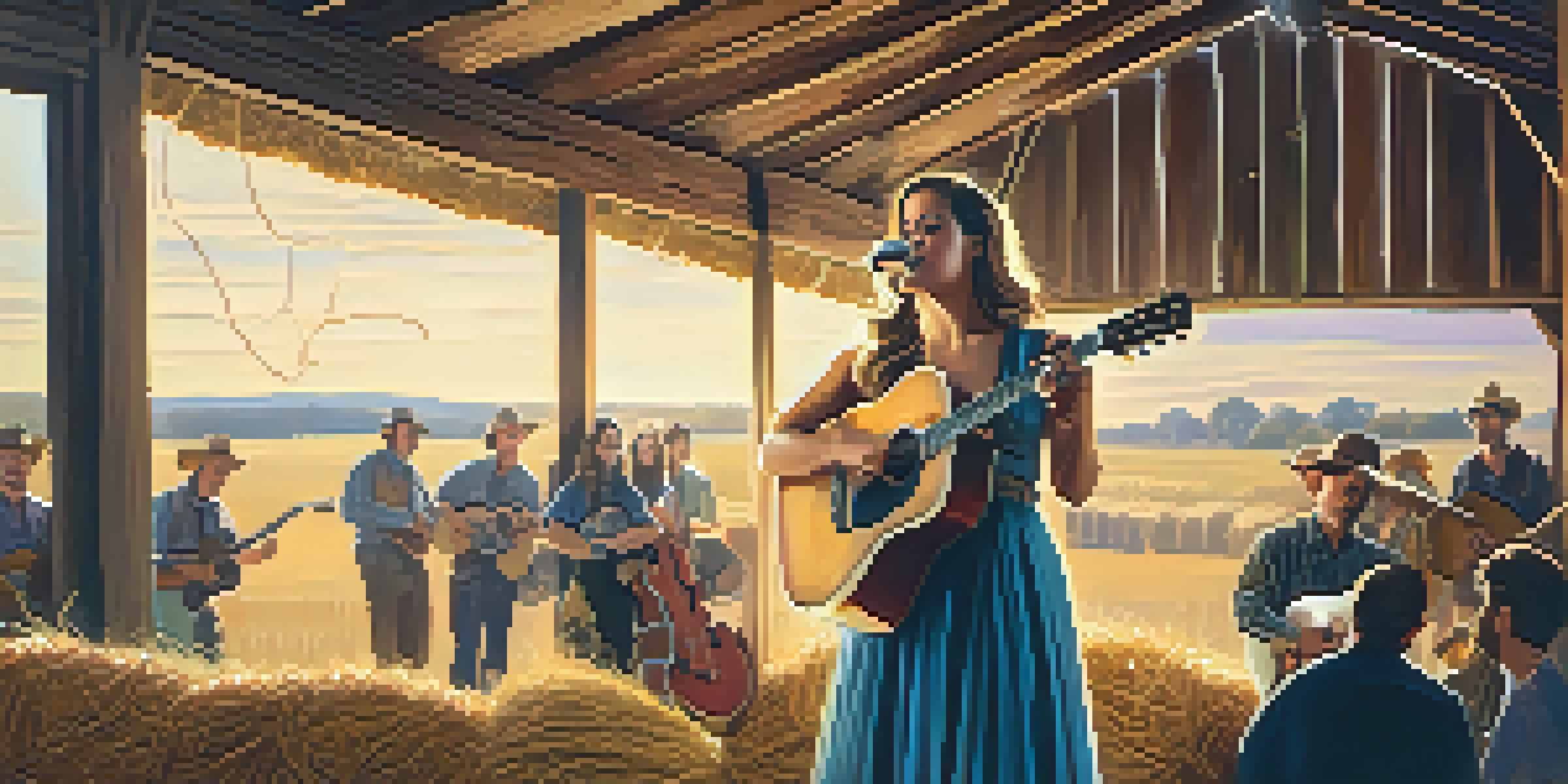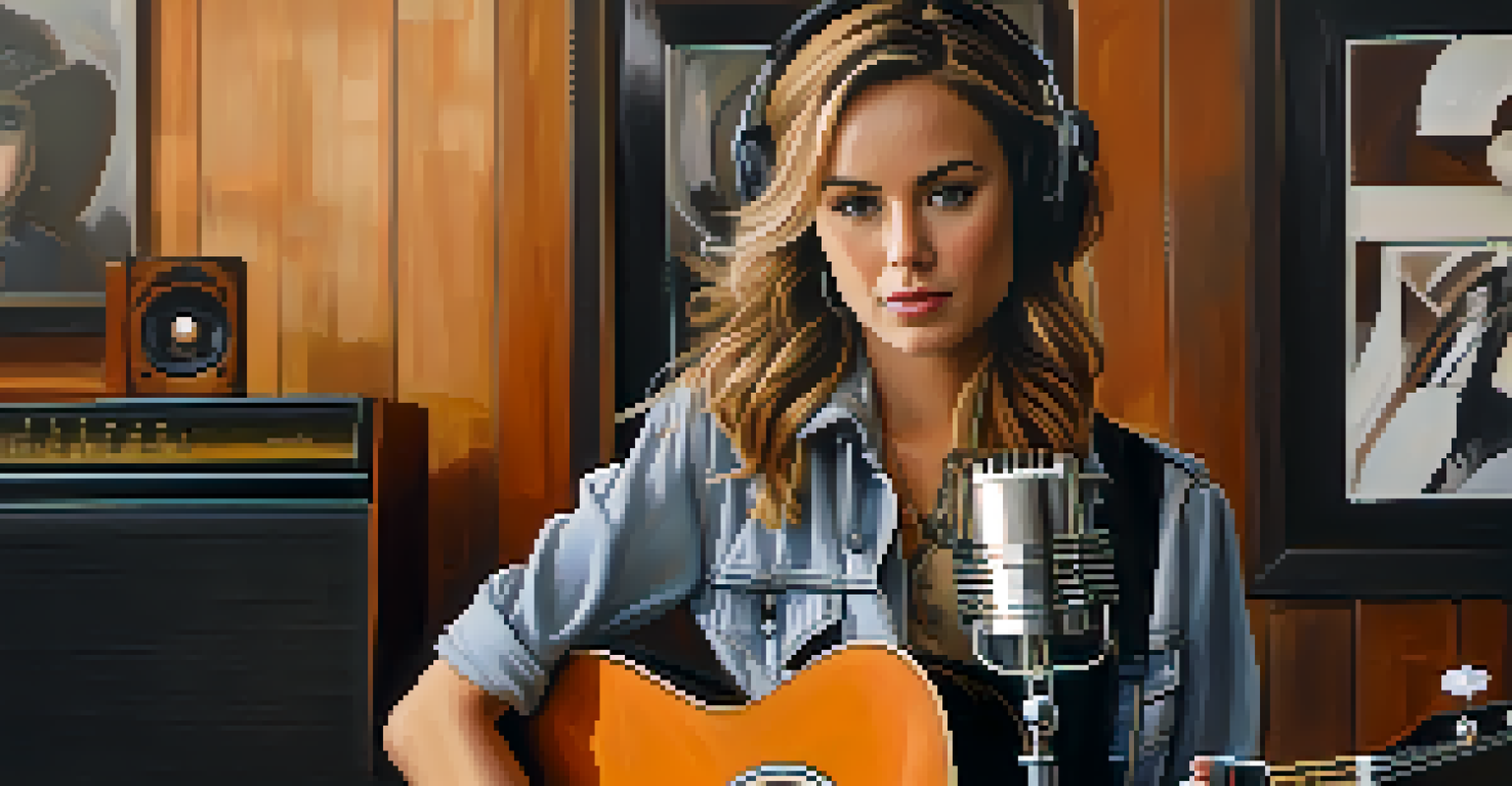Women in Country Music: Trailblazers and Innovators

The Pioneering Spirit of Early Female Country Artists
In the early days of country music, women like the Carter Family’s Maybelle Carter and the legendary Kitty Wells broke new ground. They not only contributed to the genre but also challenged societal norms by stepping into a male-dominated industry. Their music resonated with audiences, showcasing both talent and resilience.
The most important thing is to be true to yourself and those around you.
Maybelle Carter, known for her innovative guitar playing, created a sound that became a hallmark of country music. Meanwhile, Kitty Wells’s hit 'It Wasn’t God Who Made Honky Tonk Angels' became a rallying cry for women everywhere, addressing themes of empowerment. These artists paved the way for future generations, demonstrating that women could be both artists and leaders.
Their contributions laid the groundwork for the acceptance of women in country music, inspiring countless female artists to pursue their dreams. By sharing their stories and struggles through song, they created a legacy that continues to influence the genre today.
The Rising Voices of the 1970s and 1980s
The 1970s and 1980s saw a surge of female talent in country music, with artists like Dolly Parton, Loretta Lynn, and Emmylou Harris leading the charge. Each of these women brought their unique style and perspective, enriching the genre with diverse narratives. Dolly Parton, for instance, is celebrated not just for her voice but for her songwriting prowess and business acumen.

Loretta Lynn's candid lyrics about her life experiences, particularly in songs like 'Coal Miner's Daughter,' resonated with many and highlighted the struggles of women in rural America. Emmylou Harris, with her ethereal voice and genre-blending approach, opened doors for new collaborations, showcasing that country music could evolve while still honoring its roots.
Trailblazers of Country Music
Early female artists like Maybelle Carter and Kitty Wells challenged societal norms and paved the way for future generations in a male-dominated genre.
Together, these artists helped to solidify the place of women in country music, proving that they could be commercial powerhouses while staying true to their artistry. Their influence is still felt today, inspiring a new generation of female musicians.
The 1990s: A Breakthrough Decade for Women
The 1990s marked a significant turning point for women in country music, with artists like Shania Twain, Faith Hill, and Mary Chapin Carpenter achieving unprecedented success. Shania Twain, with her fusion of pop and country, changed the landscape of the genre, making it accessible to a broader audience. Her album 'Come On Over' remains one of the best-selling albums of all time.
You can't be afraid to speak up and speak out for what you believe in.
Faith Hill, with her powerful vocals and heartfelt ballads, quickly became a household name, while Mary Chapin Carpenter brought a storytelling approach that resonated deeply with fans. This era saw women not just participating in country music but dominating the charts, proving that female voices could lead.
The success of these artists opened doors for women in the industry, leading to more female-driven projects and collaborations. This wave of success created a sense of community among female artists, fostering an environment where they could support and uplift each other.
New Millennium and the Rise of Contemporary Artists
As the new millennium dawned, a fresh wave of women in country music emerged, with artists like Carrie Underwood, Miranda Lambert, and Kacey Musgraves making their marks. Carrie Underwood, a winner of 'American Idol,' brought a blend of pop sensibility and traditional country, appealing to a diverse fan base. Her emotional ballads and powerful performances earned her numerous awards and accolades.
Miranda Lambert, known for her fierce independence and storytelling, became a voice for many women, addressing themes of heartbreak and resilience. Kacey Musgraves, with her innovative sound and thought-provoking lyrics, challenged conventions and brought a modern twist to country music.
Rise of Female Powerhouses
The 1990s and beyond saw female artists such as Shania Twain and Carrie Underwood achieving unprecedented success, transforming the landscape of country music.
These artists not only found commercial success but also used their platforms to advocate for issues like gender equality and mental health awareness. Their contributions have helped redefine what it means to be a woman in country music, making the genre more inclusive and representative.
The Role of Women in Shaping Country Music Culture
Women in country music have played a crucial role in shaping the culture and identity of the genre. Through their music, they have addressed social issues, personal struggles, and triumphs, creating a rich tapestry of narratives that resonate with fans. This cultural influence extends beyond music, impacting fashion, lifestyle, and even social movements.
For instance, artists like Dolly Parton have become cultural icons, with their style and personality influencing generations. Similarly, the authenticity and vulnerability displayed by these artists in their songs create connections with listeners, fostering a sense of community and shared experience.
Moreover, women in country music have been at the forefront of philanthropic efforts, using their fame to give back to society. Their commitment to various causes reflects a deep sense of responsibility and connection to their roots, proving that their impact goes far beyond the stage.
Challenges Faced by Women in the Industry
Despite significant progress, women in country music still face challenges in an industry that can be unforgiving. Issues such as gender bias, unequal pay, and limited representation in leadership roles persist, making it difficult for many talented women to thrive. These barriers can discourage emerging artists from pursuing their dreams.
The fight for visibility on radio playlists and award nominations often highlights the gender disparities within the industry. Many female artists find themselves navigating a landscape that favors male voices, which can be disheartening. However, the growing awareness of these challenges has sparked important conversations and movements advocating for change.
Ongoing Challenges in the Industry
Despite progress, women in country music still face challenges such as gender bias and unequal pay, highlighting the need for continued advocacy and support.
Organizations and initiatives aimed at supporting women in country music are beginning to emerge, creating more opportunities for collaboration and mentorship. By addressing these challenges collectively, the industry can work towards a more equitable future where women are celebrated for their contributions.
Looking Forward: The Future of Women in Country Music
The future of women in country music looks promising, with a new generation of artists ready to take the stage. Young talents like Margo Price, Brandi Carlile, and Ashley McBryde are pushing boundaries and redefining the genre. Their innovative approaches and willingness to tackle taboo subjects are paving the way for a more inclusive and diverse sound.
As the industry continues to evolve, there's a growing recognition of the need for female voices and perspectives. Initiatives aimed at promoting female artists and fostering collaboration are gaining momentum, creating a more supportive environment. This shift signifies a commitment to recognizing and valuing the contributions of women in country music.

With the continued advocacy for equality and representation, we can expect to see even more women stepping into the spotlight. As they share their stories and artistry, they will undoubtedly inspire future generations, ensuring that the legacy of women in country music endures.